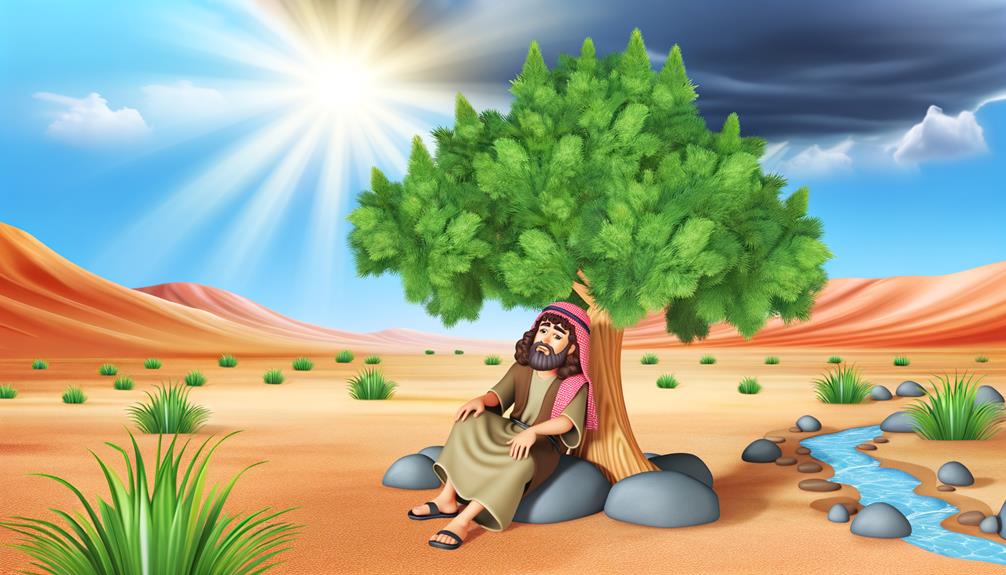Meaning of Juniper in the Bible: Symbol of Protection
In the Bible, the juniper tree is a potent symbol of resilience, refuge, and divine provision. Its presence in arid Near East landscapes underscores themes of survival and spiritual endurance.
The juniper shelters and sustains, as seen in Elijah’s experience, where it provided him solace and nourishment during his despair. This tree’s recurring biblical mention highlights God’s care and support amidst life’s trials.
Additionally, the juniper in Psalms symbolizes both purification and judgment, adding layers to its spiritual significance. By exploring juniper’s biblical roles, deeper insights into its emblematic meanings are disclosed.

Meaning of Juniper in the Bible: Symbolism, Biblical Reference, and Spiritual Insights
| Aspect | Details |
|---|---|
| Name Origin | Latin (Juniperus) |
| Biblical Reference | 1 Kings 19:4–5 |
| Mentioned With | Prophet Elijah |
| Meaning | Symbol of shelter, refuge, and divine provision |
| Symbolism | Protection, comfort, and solitude in trials |
| Spiritual Insight | Represents God’s care during despair and exhaustion |
Historical Context of Juniper

How did the juniper plant come to hold historical significance in biblical times?
The juniper, often referenced in biblical texts, holds a multifaceted significance rooted in its prevalence across the arid landscapes of the Near East. Its hardy nature made it a symbol of resilience and sustenance in harsh environments.
Scriptural references often depict it in scenarios where survival and divine intervention are focal themes. Additionally, the juniper’s use as a source of fuel and shelter would have made it an indispensable resource for nomadic and settled populations alike.
Consequently, its inclusion in biblical narratives underscores a deeper metaphorical and practical significance, linking spiritual endurance with the tangible hardships faced by ancient communities. This historical context enriches its symbolic resonance in sacred texts.
Juniper as a Refuge

In biblical narratives, the juniper frequently serves as a symbol of refuge, providing physical and spiritual sanctuary to those seeking solace and protection in desolate environments.
This symbolism is evident in various scriptural passages where the juniper tree offers shade and sustenance in arid landscapes. Its presence signifies divine provision and a retreat from adversities, embodying a place of respite and renewal.
The juniper’s ability to thrive in harsh conditions underscores themes of resilience and divine care, offering believers a tangible representation of God’s compassion.
Elijah and the Juniper Tree

Elijah’s encounter with the juniper tree in the wilderness serves as a poignant narrative of despair and divine intervention.
In this episode, the juniper tree provides a physical and spiritual shelter where Elijah experiences God’s provision through sustenance and rest.
Exploring this context reveals the profound spiritual significance of the juniper tree as a symbol of God’s care and a place of renewal during moments of deep distress.
Elijah’s Wilderness Experience
During a period of profound despair, the prophet Elijah sought refuge under a juniper tree in the wilderness, symbolizing a moment of divine intervention and spiritual reflection.
This crossroads in Elijah’s life, detailed in 1 Kings 19:4-5, underscores the prophet’s vulnerability and humanity. Fleeing from Queen Jezebel’s threats, he experienced intense fear and exhaustion, leading him to plead for death.
The juniper tree’s shade provided not just physical shelter but also a symbolic space for contemplation and divine encounter. This episode reveals the interplay between human frailty and divine strength, marking a pivotal shift in Elijah’s prophetic mission.
Analyzing this context, one can appreciate the juniper tree as a motif of solace and spiritual renewal in biblical literature.
Divine Provision Under Juniper
Amidst Elijah’s profound despair under the juniper tree, the narrative shifts to highlight a moment of divine provision, where an angel provides sustenance, signifying God’s unwavering support and care in times of extreme vulnerability.
This episode underscores the juniper tree as a symbol of refuge and divine intervention. In Elijah’s darkest moment, feeling despondent and isolated, the appearance of an angel with bread and water illustrates that God’s presence and aid are ever-present, even in the most desolate circumstances.
This act of nourishment not only revitalizes Elijah physically but also reinvigorates his spiritual resolve, emphasizing the theme of divine provision. Consequently, the juniper tree becomes a poignant backdrop for God’s compassionate response to human frailty.
Spiritual Significance Explored
In exploring the spiritual significance of Elijah’s encounter with the juniper tree, it becomes evident that this biblical episode serves as a profound metaphor for divine solace and rejuvenation in times of overwhelming despair.
When Elijah, fleeing from Jezebel’s wrath, collapses in exhaustion under the juniper tree, he finds not just physical rest, but a divine encounter that revitalizes his spirit.
The juniper tree, consequently, symbolizes a sanctuary where God provides sustenance and renewal.
This narrative underscores the theme that, even in moments of profound hopelessness, divine intervention can offer comfort and a renewed sense of purpose.
The juniper tree hence becomes a powerful emblem of God’s unwavering support during life’s darkest trials.
Symbolism in Prophecy

In biblical prophecy, the juniper tree often symbolizes protection and divine intervention, reflecting its role in providing shelter and sustenance.
This tree’s presence in scripture serves as a metaphor for God’s provision during times of desolation and distress.
Examining these symbolic representations offers a deeper understanding of its prophetic significance, particularly how it underscores themes of refuge and hope.
Juniper’s Prophetic Significance
Exploring the prophetic significance of juniper in the Bible reveals its symbolic representation of refuge, purification, and divine intervention.
In prophetic contexts, juniper often appears as a place of shelter, particularly when the prophet Elijah sought refuge under a juniper tree (1 Kings 19:4-5).
This imagery extends to purification, as juniper’s resilience in arid conditions symbolizes spiritual endurance and cleansing. Divine intervention is also evoked through juniper’s presence, indicating God’s provision in times of hardship.
The juniper’s ability to thrive in desolate environments metaphorically underscores the theme of divine sustenance and protection. Analyzing these elements within their biblical context uncovers layers of spiritual meaning that juniper embodies in prophetic literature.
Symbolic Representation in Scripture
The juniper tree, often referenced in biblical scripture, serves as a multifaceted symbol embodying themes of refuge, purification, and divine sustenance.
In 1 Kings 19:4-5, the prophet Elijah finds shelter under a juniper tree, highlighting its role as a place of refuge during times of despair.
Moreover, the juniper’s association with purification is evident in its use for ritual cleansing practices, as its aromatic properties were believed to purify the air and soul.
Finally, its significance in divine sustenance is portrayed through the sustenance provided to Elijah by an angel while he rested under the juniper, symbolizing God’s provision and care.
Consequently, the juniper tree encapsulates profound spiritual lessons woven through the fabric of biblical prophecy.
Juniper in Psalms

Within the Psalms, the juniper tree is often referenced as a symbol of desolation and divine judgment, reflecting its harsh environment and sparse growth.
Psalm 120:4, for instance, mentions the ‘sharp arrows of the mighty, with coals of juniper,’ suggesting the intense, consuming nature of divine retribution. This imagery captures the juniper’s resilience in barren landscapes, which parallels the psalmist’s expression of suffering and isolation.
The juniper’s association with coals also underscores the purifying and punitive aspects of God’s judgment. Hence, in the Psalms, the juniper tree serves as a poignant metaphor for the trials of the faithful, invoking themes of endurance amidst adversity and the transformative power of divine justice.
God’s Provision and Juniper

Amidst the arid and unforgiving landscapes where the juniper tree thrives, it serves as a profound witness to God’s provision and sustenance. This resilient tree symbolizes shelter and nourishment in the harshest conditions, reflecting divine care.
| Biblical Reference | Contextual Significance |
|---|---|
| 1 Kings 19:4-5 | Elijah finds rest under a juniper, receiving sustenance. |
| Job 30:4 | The juniper’s roots provide food during dire times. |
| Psalms 120:4 | Symbolizes purification and divine correction. |
| Jeremiah 17:6 | Represents survival amidst desolation. |
Lessons From Juniper

Exploring the lessons from the juniper tree reveals deeper insights into resilience, divine guidance, and spiritual fortitude as illustrated in various biblical narratives.
The juniper tree, often found in arid and desolate landscapes, symbolizes endurance and the ability to thrive under harsh conditions. This parallels the spiritual resilience required to navigate life’s trials.
In 1 Kings 19:4-5, the prophet Elijah finds refuge under a juniper tree, highlighting divine provision and guidance during moments of despair. Additionally, the juniper’s capacity to provide shelter and sustenance serves as a metaphor for God’s unwavering support.
These narratives collectively underscore the importance of faith, perseverance, and reliance on divine wisdom in overcoming challenges.
Juniper in Christian Tradition

The juniper tree holds a significant place in Christian tradition, symbolizing not only the themes of protection and divine intervention but also serving as a poignant reminder of God’s sustenance and care throughout the spiritual journey.
In the Old Scriptures, Elijah’s refuge under a juniper tree (1 Kings 19:4-8) epitomizes divine providence, as God provides nourishment during his despair.
Additionally, the juniper’s resilient nature amidst harsh conditions reflects the enduring faith required of believers. Early Christians often viewed the tree as a metaphor for spiritual fortitude and divine guardianship.
Its presence in Christian art and literature underscores the juniper’s emblematic role, bridging biblical narratives with the lived experiences of faith communities seeking solace and strength.
Modern Interpretations of Juniper

In contemporary theological discourse, the juniper tree continues to be a potent symbol, often reinterpreted to address modern spiritual challenges and themes of resilience in the face of adversity.
Modern interpretations of the juniper tree emphasize its relevance to contemporary life in the following ways:
- Resilience: The juniper’s ability to thrive in harsh conditions symbolizes human resilience and the capacity to endure hardships.
- Sanctuary: Like the biblical Elijah, people find solace and refuge under the juniper, representing places of spiritual and emotional sanctuary.
- Renewal: The evergreen nature of the juniper symbolizes perpetual renewal and hope, encouraging individuals to seek continuous personal and spiritual growth.
These interpretations underscore the juniper’s enduring significance in fostering spiritual reflection and growth.
Conclusion
The juniper, deeply rooted in biblical texts, serves as a multifaceted symbol encompassing refuge, divine provision, and prophetic insight.
Historical narratives, such as Elijah’s encounter, underscore its role as a haven during times of distress.
Symbolically, it resonates within Psalms and prophecies, illustrating themes of shelter and sustenance.
Through rigorous exegesis, juniper emerges as a significant theological motif, akin to a beacon in a dark alley, guiding believers towards understanding God’s unwavering support and care.






